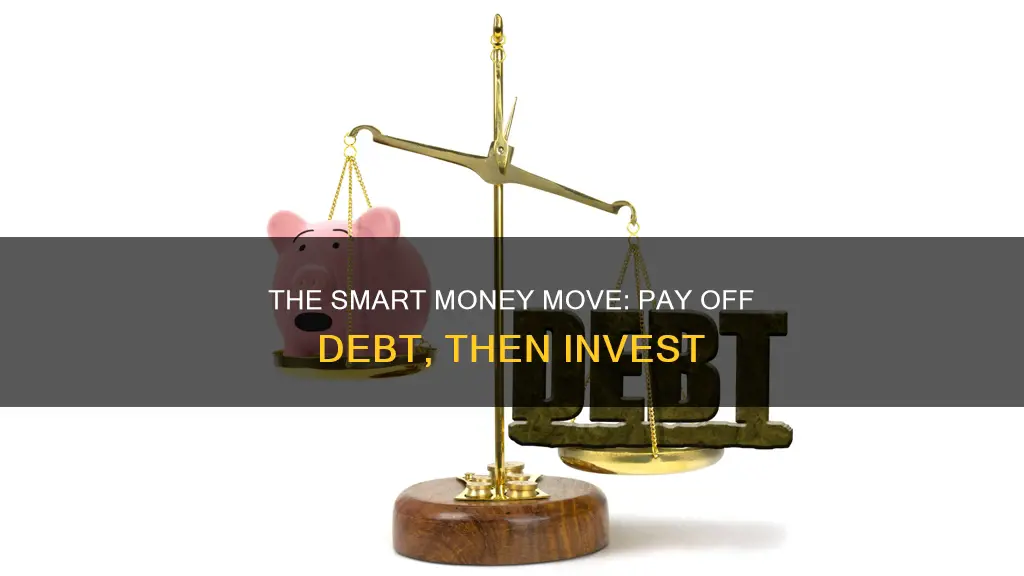
Whether to pay off consumer debt or invest depends on your individual circumstances. However, there are several reasons why paying off consumer debt first is a good idea.
Firstly, the interest rates on credit cards are often extremely high. Credit card interest rates can be as high as 20%, whereas the average return in the market is far lower. Therefore, unless you are a brilliant investor, you will be losing more to interest payments than you would be gaining through investing.
Secondly, carrying a lot of debt can negatively impact your credit score, which can have wider-ranging consequences than you might think. Even if you haven't maxed out your credit cards, keeping a high credit utilisation ratio can affect your score. A poor credit score can lead to higher interest rates and fewer loan options, and can even make it harder to find housing.
Thirdly, paying off debt means you'll have more money available to put toward other financial goals, such as investing, adding to your emergency fund, or saving for retirement.
Finally, there is a mental and emotional benefit to paying off debt. Being able to escape credit card or loan payments can take a weight off your shoulders and improve your overall psychological well-being.
| Characteristics | Values |
|---|---|
| Interest rates | Credit cards often carry the highest interest rates, which can hover around 20% or more. |
| Interest accumulation | Compound interest can help build wealth but can also increase debt. |
| Credit score | Carrying a lot of debt can negatively impact your credit score, making it harder to borrow money, rent an apartment, or open utility accounts. |
| Credit utilization ratio | A high credit utilization ratio (the amount of credit used compared to the total credit limit) can lower your credit score and make you appear risky to creditors. |
| Retirement timeline | It's generally best to avoid bringing debt into retirement, so consider how close you are to retirement when deciding whether to pay off debt or invest. |
| Emotional burden | The burden of debt can take a toll on your psychological well-being, so it may be better to prioritize paying it off to reduce stress and anxiety. |
| Investment returns | The stock market has historically returned an average of 10%, while credit cards have rates that often exceed this. |
| Tax benefits | Some types of debt, such as student loan interest and mortgage loan interest, are tax-deductible, which can reduce your taxable income. |
| Cash flow | Paying off debt can increase your cash flow, allowing you to put more money towards other financial goals or everyday needs. |
What You'll Learn

High-interest credit card debt is expensive and impacts future credit access
High-Interest Credit Card Debt: Why It's Expensive and Impacts Future Credit Access
Credit card debt is expensive, especially when it comes with high interest rates. The average credit card interest rate is around 20%, with some sources citing rates as high as 24.37% as of April 2024. These rates far exceed the returns you could expect from most investments, making it crucial to prioritise paying off this type of debt.
The high interest associated with credit card debt means that the longer you take to pay it off, the more money you will owe. This can create a cycle where debt accumulates faster than you can pay it off, leading to a situation that may feel impossible to escape. The high interest also means that even if you are only making the minimum monthly payments, you are still paying a significant amount of money over time.
Additionally, carrying high-interest credit card debt can negatively impact your credit score. Lenders consider your credit utilisation ratio, which is the amount of credit you are currently using compared to your total available credit. If you are constantly maxing out your credit cards, lenders will consider you a high-risk borrower, which can lead to lower credit scores. A low credit score can make it more difficult and expensive to borrow money in the future, affecting your ability to get a loan, rent an apartment, or even get hired for certain jobs.
The impact of high-interest credit card debt on your finances and future credit access makes it crucial to prioritise paying it off before investing. By eliminating this debt, you can improve your financial stability and ensure that you have access to credit when you need it.
Fear of Losing Money Keeps People from Investing
You may want to see also

Paying off debt improves your credit score
Paying off debt can improve your credit score in a number of ways. Firstly, it establishes a positive repayment history, which is a key factor in determining your credit score. Lenders want to see that you are reliable and able to pay back what you owe, so making regular, timely payments is essential.
Another important factor is your credit utilisation ratio, which is the amount of credit you are currently using compared to your overall credit limit. Aim to keep this ratio below 30% to improve your credit score. Paying off debt, especially credit card debt, can help lower your credit utilisation ratio. For example, if you have a credit card with a $1,000 limit and a balance of $500, your credit utilisation rate is 50%keeping the account open, you reduce the amount of available credit you're using, which can positively impact your credit score.
Additionally, paying off debt can help you address the emotional burden of debt. Debt can take a toll on your psychological well-being, causing stress and anxiety. Prioritising debt repayment can improve your overall financial wellness and give you a sense of gratification.
It's worth noting that paying off debt may not always lead to an immediate increase in your credit score, and there could be temporary dips. Closing certain lines of credit, especially instalment loans like car loans or mortgages, might temporarily lower your credit score. This is because credit scoring models take into account the mix of credit types you have, including both revolving credit (like credit cards) and instalment credit. However, any negative impact is usually small and short-lived, and the benefits of being debt-free outweigh the potential minor dip in your credit score.
Furthermore, if you're carrying high-interest credit card debt, it often makes financial sense to prioritise paying off that debt as quickly as possible. Credit cards typically have high-interest rates, often around 20%, which can quickly accumulate and become difficult to manage. By paying off this type of debt, you can save money on interest and improve your overall financial health.
Apple Investors: Who's Involved?
You may want to see also

The emotional burden of debt can be significant
Stress, Anxiety, and Depression
Debt is a significant source of stress, with 54% of adults reporting that debt causes them stress. This stress can lead to anxiety and depression, with feelings of being overwhelmed and hopelessness. The stress of debt can also negatively impact sleep, causing a lack of focus and constant worry.
Anger
Debt can lead to anger, not just at oneself but also at others. This anger can ruin relationships and have negative physiological effects, such as migraines and heart disease.
Low Self-Esteem
Debt can cause low self-esteem, making individuals feel like they are not enough and reducing their overall quality of life. It can lead to feelings of sadness and anger, often accompanied by a sense of powerlessness.
Fear and Shame
The fear associated with debt is significant. Individuals may fear missing payments, eviction, foreclosure, bankruptcy, or losing their job. They may also feel ashamed or embarrassed about their financial situation, leading them to hide their struggles from family and friends.
Relationship Issues
Arguments about money are a top cause of divorce, second only to infidelity. High levels of debt and poor communication can lead to stress and arguments within a relationship.
Physical Health Issues
The emotional burden of debt can also impact physical health. Stress caused by debt can affect blood pressure, heart rate, immune system functions, mood, memory, and weight.
Given the significant emotional burden that debt can impose, it is crucial to consider this aspect when deciding whether to pay off consumer debt or invest. Prioritising debt repayment can provide a sense of relief, control, and improved psychological well-being.
Uninvested: The Emotional Impact
You may want to see also

Investing early benefits from compounding interest
The two ingredients for compounding to be effective are the reinvestment of earnings and time. The earlier you start investing, the more compounding interest can work in your favour, even with relatively small amounts. For example, if you start saving $100 a month at age 20, earning an average of 4% annually, compounded monthly across 40 years, you will have earned $151,550 by age 65, with a principal investment of just $54,100.
The length of time a person has to invest also increases the amount of risk they are able to withstand. Younger people with many productive earning years ahead of them can afford to take more risks with their investments. A long investment time horizon enables good years in the market to balance out the bad ones, allowing market returns to come closer to their long-term averages.
Additionally, investing early gives young adults the advantage of time to study the market and refine their strategies to avoid investment pitfalls. The experience gained from investing early will play a large part in future investment success.
Smart Ways to Invest $1,000 Right Now
You may want to see also

Investing may offer tax benefits
There are two main types of investment accounts: taxable and tax-advantaged. Taxable accounts, such as brokerage accounts, offer more flexibility but returns are taxed according to how long the asset is held. In contrast, tax-advantaged accounts like IRAs and 401(k)s provide upfront tax breaks, with taxes deferred until withdrawal during retirement.
Some specific examples of tax-efficient investments include municipal bonds, tax-exempt mutual funds and exchange-traded funds (ETFs), and Roth IRAs and Roth 401(k)s. Municipal bonds are issued by local governments to fund projects, and interest payments are exempt from federal taxes and may also be exempt from state and local taxes. Tax-exempt mutual funds and ETFs typically hold municipal bonds and other government securities, offering tax benefits and simplified diversification.
With a Roth IRA, you contribute after-tax dollars, and once you reach the age of 59 1/2, you can begin withdrawing money tax-free, including all the returns your investments have seen over the years. Similarly, with a Roth 401(k), you invest with after-tax dollars, and qualified withdrawals in retirement are tax-free.
It's important to note that while investing may offer tax benefits, it's generally recommended to prioritize paying off high-interest consumer debt, such as credit card debt, before investing. This is because the interest rates on credit cards are typically higher than the returns you can expect from investments, so you'll likely come out ahead by paying off this debt first.
Investor's Losing Bet: Why Double Down?
You may want to see also
Frequently asked questions
Consumer debt, especially credit card debt, often has high interest rates, which can be detrimental to your credit score.
Your credit score is based on several factors, one of which is your credit utilisation ratio, or the amount of credit you are using compared to how much credit you have available. If you are constantly maxing out your credit card, your credit score will take a hit, making it difficult to secure loans with low interest rates in the future.
Credit cards often carry the highest interest rates, so if you are carrying a lot of credit card debt from month to month, you should focus on paying that off first. As of April 2024, the average interest rate on credit cards was 24.37%.
The stock market has historically returned around 10% on average, while credit cards have rates that hover around 20%. Unless you aggressively pay down credit card debt first, you will be losing more money to interest than you would gain through investing.
Having debt can be a significant source of stress and anxiety, which can negatively impact your overall quality of life. Paying off debt can give you peace of mind and allow you to focus on other financial, personal, and family goals.







